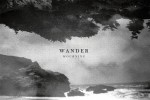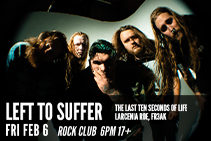
WANDER
Oakland, CA quartet Wander, and their full-length debut “Mourning,” in many ways stand in contradiction to what one might expect going in. Despite the “newcomer” label, their sound is confident, with the kind of polish befitting veteran professionals. While we’re judging books by their covers, we may presume an album entitled “Mourning,” featuring a black and white album cover photo of waves crashing on a rocky shore to be filled with lengthy ruminations leaning heavily on a generally somber soundscape. How shocked we would be, then, when we hear the album opener, a tightly-wound, explosive two and a half minutes that serve us notice that we shouldn’t believe everything our previous experience with post-rock iconography would lead us to assume.
Some deeper digging reveals a sufficient explanation for how Wander has been able to come out the gate so boldly. Guitarist Christian Francisco first assembled the skeleton of what would become “Mourning” in 2007 as a fifteen year-old. Three of the four current band members were involved even then – Francisco, his drummer brother Ryan, and bassist Joseph Aguda, so the core of the band has been through every step of the process, honing these seven tracks into what we hear today. A second guitarist, Bernard Barcela, was added in 2012.
They self-released the “Short Story Collection” EP in 2013, but kept working at perfecting “Mourning.” Eventually Ryan Francisco would step into the role of primary composer, and the “Mourning” studio sessions were set into motion later in Fall 2013 with producer Jack Shirley (Deafheaven, Whirr). The most stunning revelation here is that this album was tracked live to tape in its entirety over the course of a single day. It was self-released in 2014, before the band eventually signed to Other People Records and gave “Mourning” a proper release earlier this year.
The opener, “Calamity,” sets a tone that is immediately antithetical to most of our post-rock expectations. It clocks in at 2 minutes, 23 seconds, pummeling the listener from the first note, before launching into a melody that echoes a more traditional sound, but is propelled forward by hyperactive drumming, launching the listener without notice into unexpected, and decidedly exciting territory. Two subsequent tracks, the single “Soar,” and “Oblivion” move along at a similar pace, driving forward with striking immediacy, matching dramatic melodies with torrid pacing. They waste no time making their point, clocking in at 2:18 and 3:15, respectively, positively microscopic song lengths by post-rock standards. The sense of urgency and almost pop-oriented structural ideology are refreshing and aid in balancing out the album’s more pensive tracks.
Wander proves capable at more extended running times as well. “Farewell” has a kind of soaring melancholy (as contradictory as that phrase may seem), reminiscent of Mono re-interpreted in a more upbeat capacity. The title track, at nearly fifteen minutes, immediately stands out as the most definitively “post-rock” song of the bunch. It doesn’t disappoint, riding its own ebb and flow of soft moments and stirring crescendos, but also effectively punctuating what has come before. Despite its near-EP length, the track never feels dragged out. Rather, it acts much like the waves that are glimpsed on the album cover – alternating soothing passages and crashing swells until you find yourself hypnotized, drifting unaware of anything surrounding you, becoming enveloped as the final moments arrive to quietly pull you under. Thankfully, life isn’t dictated by extended metaphors such as these, and we can re-emerge back at the beginning and start the process anew.
With one album in the books, Wander appears to be a real contender to join the top ranks of a new generation of post-rock artists. One hopes that it doesn’t take them seven more years to craft their next album, but I suspect that will not be an issue. Both polished and earnest, traditional yet unique, this is a band to keep an eye on during the years to come.











